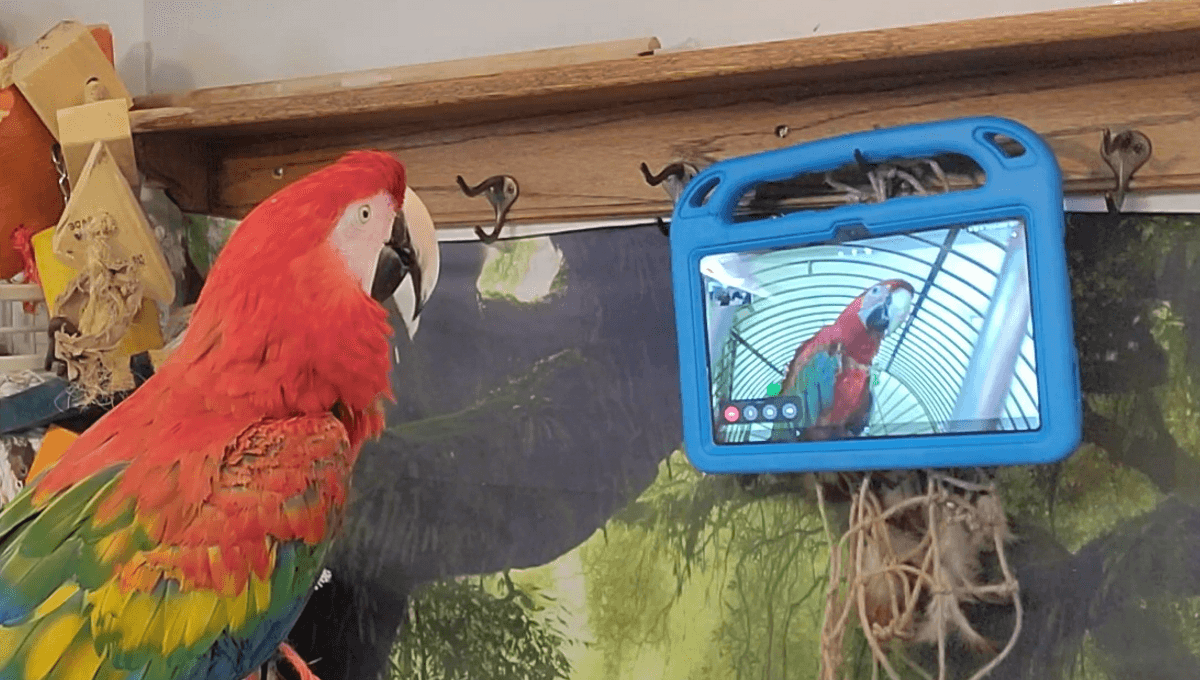
Parrots are the fourth most popular pet in the United States with over 20.6 million pet parrots kept in households across the country. These birds are highly intelligent with complex social, cognitive, and emotional needs. In the wild, most parrot species would usually be found in large flocks, but captive birds often live alone, and so may be missing out on socialization with other birds. Now, a study has set up video calls between parrots allowing them to make friends and fulfill their social needs.
The first-of-its-kind experiment was carried out over three months and featured 18 birds of various parrot species including African gray parrots, cockatiels, and macaws. According to the researchers, it’s the first study to offer animals the means to contact other animals whenever they wanted. It began with a phase one “meet and greet” set up so that the birds learned a connection between ringing a bell, touching a photo of another bird on their tablets, and then later, being connected with the bird of their choice via a video call.
The birds were organized into five different groups. During the first phase, each bird met twice with all the other birds in their group, and received a reward for ringing the bell, but not during the calls themselves. The call was ended if the parrots showed disinterest, left the space, or exhibited any signs of stress, and at this stage any that did often were released from the study.
In phase two, the remaining 15 birds were re-sorted into six smaller groups. Here they had multiple three-hour sessions in which they could choose to make calls to other birds in their group, with a maximum of two calls per three-hour session. After each session, the caretakers uploaded the video recordings and submitted a diary of the video call. At the end of phase two, each caretaker filled out a post-study survey and an interview.
Comments from the interview and the survey showed that the caretakers perceived the birds to enjoy the experience of having video calls with other birds. None of the caretakers reported a negative experience with their bird. One caretaker of a parrot known as P2 wrote: “He was engaged because he was watching the screen, talking to [P1], inviting [P1] to come play with him. When [P1] walked off the screen, he called for [P1] to come back.”
Some of the caretakers reported new behaviors from their pet participants including new flying behavior, calmer behaviors, and new foraging behaviors. Another bird known as P11 seemed to become more confident, as the caretaker reported: “After the calls with [P10], she started flying more. I think she realized that flying is an okay behavior. […] I’m very happy about this!”
Overall the team found that most of the birds (78 percent) reacted to the presence of another bird on the screen, and that the parrots reacted differently depending on which bird was on the other end of the call. Furthermore, the more calls the parrots received, the more calls they made, and were more likely to stay engaged during the calls that they had started.
“We saw some really encouraging results from the study. The parrots seemed to grasp that they were truly engaging with other birds onscreen and their behaviour often mirrored what we would expect from real-life interactions between these types of birds,” Dr Jennifer Cunha, co-author and co-founder of Parrot Kindergarten, Inc. said in a statement.
“All the participants in the study said they valued the experience, and would want to continue using the system with their parrots in the future.”
The team is continuing to work together on developing robust ethical frameworks for the physical, mental, and emotional well-being of the animals that do not center around human caretakers. “Studies like this will help us learn what that looks like and how we can build better systems in the years to come,” said Dr Ilyena Hirskyj-Douglas of the University of Glasgow’s School of Computing Science.
The paper is published in Proceedings of the 2023 CHI Conference on Human Factors in Computing Systems.
Source Link: Pet Parrots Taught To Video Call Each Other To Prevent Loneliness